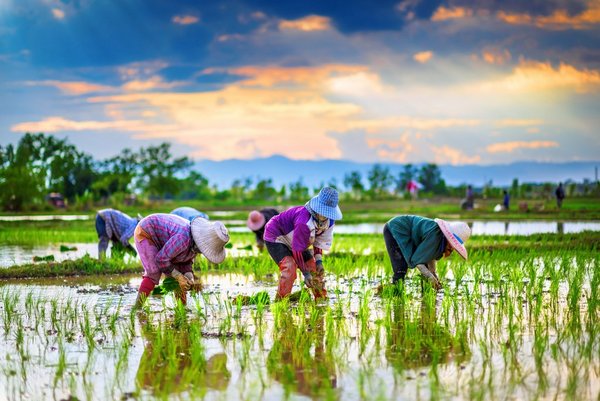 Read this article in French
Read this article in French- Share this article
- Subscribe to our newsletter
Reducing methane emissions from small-scale farming
A new initiative to help developing countries lower methane emissions from small-scale farming was launched by the International Fund for Agricultural Development (IFAD) at the AIM for Climate Summit in May 2023.
The new program will receive USD 3 million in support from the Global Methane Hub and USD 1 million from the US State Department.
Around 42 per cent of methane emissions come from the agriculture sector. They are primarily caused by flooded rice cultivation, the burning of crop residues, and livestock – through enteric fermentation and manure management.
“The short atmospheric lifetime of methane means that acting now can rapidly reduce the rate of global warming,” said Juan Carlos Mendoza, Director of the Environment, Climate, Gender and Social Inclusion Division at IFAD. “Reducing methane emissions is a priority, and IFAD is investing with partners to make it happen in a way that generates global benefits but also leads to better livelihoods for rural communities.”
Over 150 countries have signed the Global Methane Pledge, established in 2020, and agreed to take voluntary action to collectively reduce global methane emissions by at least 30 per cent by 2030. However, several countries need support to develop the right strategies and processes to achieve their methane reduction goals.
The IFAD initiative will support the development of a guidebook to help countries integrate methane emission reductions into their nationally determined contributions (NDCs), mainstream reductions in their national planning, budgeting, and public investments procedures, and advance a pipeline of bankable interventions that pioneer reductions in the agricultural sector and food systems.
The Fund will also assist 15 countries in designing projects and blended finance solutions on reducing methane emissions in agriculture and food systems.
The initiative will help highlight the advantages of using a variety of solutions in reducing methane emissions. For example, introducing better feed also promotes animal health and husbandry. Using less water to grow rice, or cultivating improved rice varieties that reduce the time between planting and harvesting, can also increase rice production.
(IFAD/ile)





Add a comment
Be the First to Comment